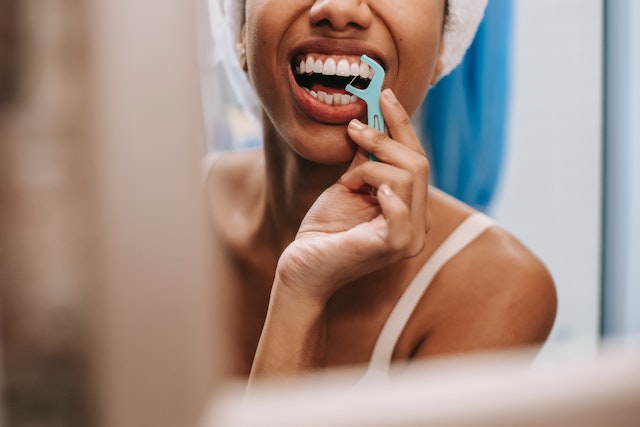Dental Plaque
Table of Contents

Dental plaque is a sticky film of bacteria that forms on teeth and gums. It can lead to several dental issues, such as tooth decay, gum disease, and bad breath. Therefore, it’s essential to understand what dental plaque is and how to get rid of it.
What is Dental Plaque?
Dental plaque is a biofilm that forms on teeth and gums. It’s composed of bacteria, saliva, and food particles. Plaque can start to form on teeth as early as 4-12 hours after brushing, making it essential to maintain good oral hygiene habits. Plaque that isn’t removed can harden and turn into tartar, which is much more challenging to remove.
The bacteria in plaque produce acid that can erode tooth enamel and cause cavities. Plaque can also irritate the gums and cause inflammation, which can lead to gum disease. If left untreated, gum disease can cause tooth loss.
How Can I Get Rid of Dental Plaque?
The good news is that you can prevent and remove dental plaque with proper oral hygiene practices. Here are some steps you can take to get rid of dental plaque:
- Brush your teeth twice a day
Brushing your teeth twice a day is the most effective way to remove plaque from your teeth. Use a fluoride toothpaste and a soft-bristled toothbrush. Brush in circular motions, and be sure to brush all surfaces of your teeth and gums, including the backs of your molars and your tongue.
- Floss daily
Flossing is essential because it removes plaque and food particles from between your teeth and under the gumline. Use a length of floss about 18 inches long and wrap it around your fingers. Gently insert the floss between your teeth and move it up and down along the sides of each tooth. Make sure to use a fresh section of floss for each tooth.
- Use mouthwash
Mouthwash can help kill bacteria and freshen your breath. Look for a mouthwash that contains fluoride to strengthen your teeth. Swish the mouthwash around your mouth for 30 seconds, then spit it out.
- Eat a healthy diet
Limit sugary and acidic foods, which can contribute to plaque formation. Instead, eat a diet rich in fruits, vegetables, and lean protein. Drinking plenty of water can also help flush away food particles and bacteria from your mouth.
- Visit your dentist regularly
Regular dental checkups and cleanings are essential for maintaining good oral health. Your dentist can remove any plaque or tartar that has formed on your teeth and identify any dental issues early on.
Dental plaque is a common problem that can lead to several dental issues. However, with proper oral hygiene practices, you can prevent and remove plaque from your teeth and gums. Brushing your teeth twice a day, flossing daily, using mouthwash, eating a healthy diet, and visiting your dentist regularly are all essential steps for maintaining good oral health. If you have any concerns about dental plaque or other dental issues, consult your dentist.
Treatments
Here are some common dental plaque treatments in India:
- Dental Cleaning (Scaling and Polishing): This is the most common treatment for dental plaque. During this procedure, the dentist uses a special tool to remove the plaque and tartar from the teeth and gums. Afterward, the teeth are polished to remove any stains. The cost of dental cleaning in India can range from Rs. 800-1500.
- Fluoride Treatment: Fluoride is a mineral that can help strengthen tooth enamel and prevent cavities. During a fluoride treatment, the dentist applies a fluoride gel or foam to the teeth to help protect against plaque and decay. The cost of fluoride treatment in India can range from Rs. 500-1000.
- Dental Sealants: Dental sealants are a thin, protective coating applied to the back teeth to help prevent cavities. The dentist applies a liquid sealant to the teeth and then uses a special light to harden it. The cost of dental sealants in India can range from Rs. 1500-3000 per tooth.
- Antibacterial Mouthwash: Antibacterial mouthwash can help kill the bacteria that cause plaque and prevent gum disease. The dentist may recommend an antibacterial mouthwash as part of a comprehensive oral hygiene routine. The cost of antibacterial mouthwash in India can range from Rs. 200-500.
- Periodontal Therapy: If gum disease has progressed, the dentist may recommend periodontal therapy. This can include scaling and root planing, which involves deep cleaning of the teeth and gums to remove the plaque and bacteria. The cost of periodontal therapy in India can range from Rs. 3000-6000.
It’s important to note that the cost of dental plaque treatments in India can vary depending on the location, the dentist’s experience, and the materials used. If you have concerns about dental plaque, it’s best to consult a dentist for an evaluation and personalized treatment plan.
- Tips to choose Toothbrush - May 2, 2023
- Best Options to Replace Missing Teeth? - May 1, 2023
- Dental Plaque - April 28, 2023
